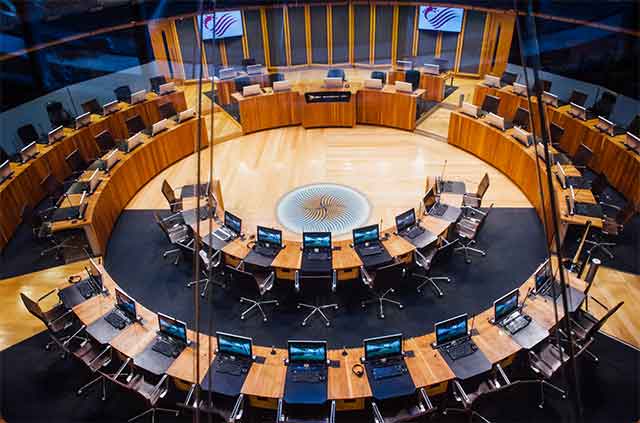Senedd members scrutinised Wales’ public services watchdog following a row over alleged anti-Conservative comments made by an investigator on social media.
Michelle Morris, the public services ombudsman for Wales, appeared before the finance committee on October 10 following the publication of an independent review.
In April, Sinead Cook, an investigator in the ombudsman’s office, which deals with complaints about councillors and services, resigned amid concerns about her posts.
David TC Davies, the former Welsh secretary who lost his seat in July’s general election, criticised Ms Cook’s “vicious” comments, calling for the ombudsman to be replaced.
The ombudsman announced an independent review but the lawyer initially chosen to lead it, James Goudie, was found to have long-standing links to Labour.
‘Political bias’
With questions surrounding the credibility of the review, Ms Morris instead appointed Melissa McCullough, who is Northern Ireland Assembly’s standards commissioner.
Dr McCullough’s review found the watchdog’s decision making was “appropriate, fair and free from political bias” but her report was described as a whitewash by a Tory councillor.
Ms Morris told the committee more than 670 cases were reviewed, with Dr McCullough’s team given full access to files and relevant staff for interviews.
Pressed about political bias, Ms Morris said her office carries out a two-stage test to assess cases based on evidence and the public interest.
She told the committee: “There should be no political bias whatsoever.
“And I believe, from the work she has done and the way she has written the report, she is saying she did not see any evidence of political bias.”
‘Fairness’
Ms Morris said the reviewers looked at every single case rather than sampled them.
The Conservatives’ Peter Fox pointed out that the review’s remit did not include investigating the initial incident or the former code of conduct team manager.
He asked: “Why was it appropriate for the former code team manager to be interviewed?”
Ms Morris said the review team interviewed all staff whose work was in the scope of the review, including the former team manager who was involved in about 80 cases.
She told the committee: “It was a matter of fairness that the former team manager had the opportunity to take part – we couldn’t compel her to.”
Ms Morris, who was appointed in April 2022, described criticism levelled at staff as unfair.
‘Misconduct’
Chris Vinestock, chief operating officer, said if the former staff member had not resigned she would have faced a formal disciplinary process.
He said: “The actions of the former code team manager, and her social media posts, did breach the existing staff standards of conduct policy.”
But he explained the ombudsman has now developed a separate social media policy following an internal review, making it clear posts could be considered misconduct
Mr Vinestock said potential employees will be asked to share details of social media accounts but they will not be monitored closely.
He added: “It’s a challenging area, people do have a right to a private life and we don’t want to interfere with that more than the job requirements actually require.”
‘Helpful’
He told committee members: “All social media posts are covered, so that’s anything made in a private or a work setting that could have an adverse effect on perception of the office.”
Ms Morris stressed she has accepted all the recommendations and lessons from the McCullough report, adding that her office aims to implement them all by April.
She said: “The way it arose is not what we would want but the piece of work that has resulted has been incredibly helpful for us.”
Katrin Shaw, chief legal adviser and director of investigations, told the committee the ombudsman no longer records political affiliation on complaint assessment forms.
Ms Shaw said about 5% of decisions will be reviewed in future, with random checks undertaken by someone outside of the ombudsman’s code of conduct team.
Closing the evidence session, Ms Morris said: “This whole incident has been so difficult … because everything we do is about maintaining that independence and impartiality.”

